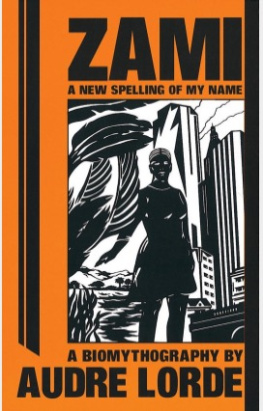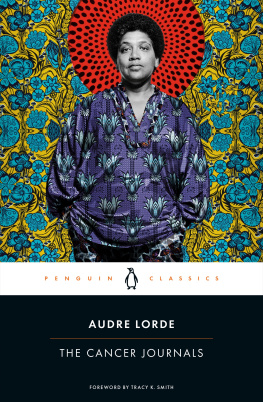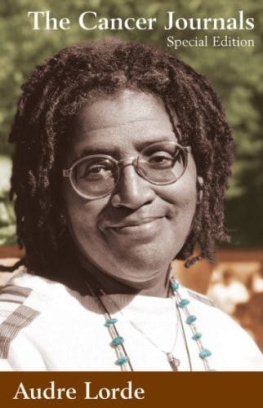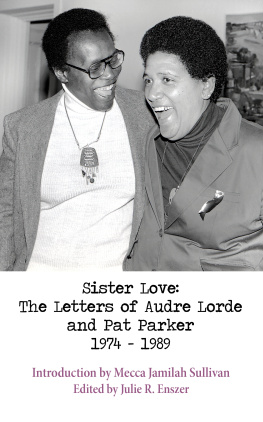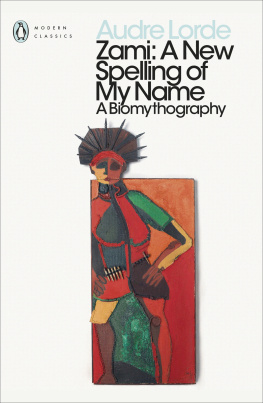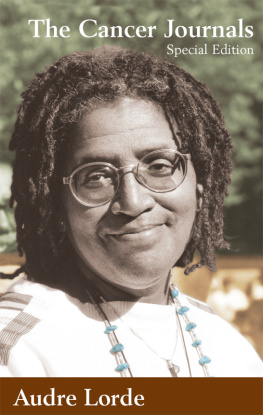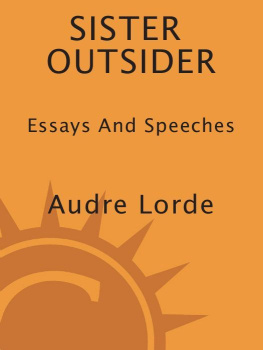Audre Lorde - The Selected Works of Audre Lorde
Here you can read online Audre Lorde - The Selected Works of Audre Lorde full text of the book (entire story) in english for free. Download pdf and epub, get meaning, cover and reviews about this ebook. year: 2020, publisher: W. W. Norton & Company, genre: Home and family. Description of the work, (preface) as well as reviews are available. Best literature library LitArk.com created for fans of good reading and offers a wide selection of genres:
Romance novel
Science fiction
Adventure
Detective
Science
History
Home and family
Prose
Art
Politics
Computer
Non-fiction
Religion
Business
Children
Humor
Choose a favorite category and find really read worthwhile books. Enjoy immersion in the world of imagination, feel the emotions of the characters or learn something new for yourself, make an fascinating discovery.

- Book:The Selected Works of Audre Lorde
- Author:
- Publisher:W. W. Norton & Company
- Genre:
- Year:2020
- Rating:5 / 5
- Favourites:Add to favourites
- Your mark:
- 100
- 1
- 2
- 3
- 4
- 5
The Selected Works of Audre Lorde: summary, description and annotation
We offer to read an annotation, description, summary or preface (depends on what the author of the book "The Selected Works of Audre Lorde" wrote himself). If you haven't found the necessary information about the book — write in the comments, we will try to find it.
The Selected Works of Audre Lorde — read online for free the complete book (whole text) full work
Below is the text of the book, divided by pages. System saving the place of the last page read, allows you to conveniently read the book "The Selected Works of Audre Lorde" online for free, without having to search again every time where you left off. Put a bookmark, and you can go to the page where you finished reading at any time.
Font size:
Interval:
Bookmark:
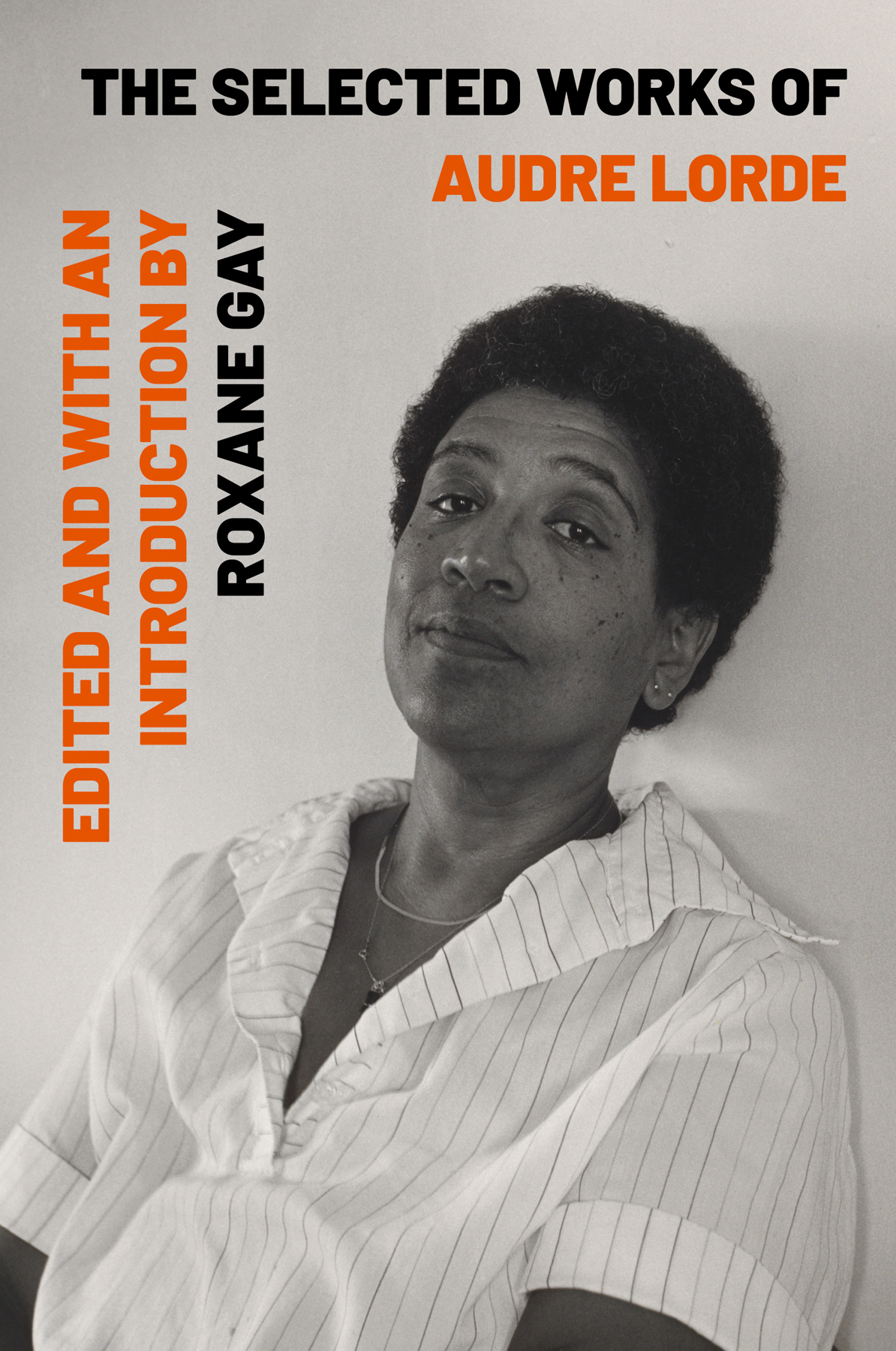
The Selected Works of
AUDRE LORDE
Edited and with an Introduction by
Roxane Gay

Contents
Roxane Gay
T here is this thing that happens, all too often, when a black woman is being introduced in a professional setting. Her accomplishments tend to be diminished. The introducer might laugh awkwardly, rushing through whatever impoverished remarks they have prepared. Rarely do they do the necessary research to offer any sense of whom they are introducing. The black woman is spoken of in terms of anecdote rather than accomplishment. She is referred to as sassy on Twitter, maybe, or as a lover of bacon, random tidbits bearing no relation to the reasons why she is in that professional setting. Whenever this happens to me or I witness it happening to another black woman, I turn to Audre Lorde. I wonder how Lorde would respond to such a micro-aggression because in her prescient writings she demonstrated, time and again, a remarkable and necessary ability to stand up for herself, her intellectual prowess and that of all black women, with power and grace. She recognized the importance of speaking up because silence would not protect her or anyone. She recognized that there would never be a perfect time to speak up because, while we wait in silence for that final luxury of fearlessness, the weight of that silence will choke us.
In 1979, for example, Audre Lorde wrote a letter to Mary Daly, and when Daly did not respond to her missive Lorde made her entreaty an open letter. Lorde was primarily concerned with the erasure of black women in Dalys Gyn/Ecology, a manifesto urging women toward a more radical feminism. In her open letter, Lorde wrote, So the question arises in my mind, Mary, do you ever really read the work of Black women? Did you ever read my words, or did you merely finger through them for quotations which you thought might valuably support an already conceived idea concerning some old and distorted connection between us? This is not a rhetorical question. The letter is both gracious and incisive. What Lorde is really demanding of Daly and white feminists more broadly is for them to seriously engage with and acknowledge black womens intellectual labor.
In the thirty years since Lorde wrote that open letter, black women have continued to implore white women to recognize and engage with their intellectual contributions and the material realities of their lives. They have asked white women to acknowledge that, as Lorde also wrote in her open letter to Daly, The oppression of women knows no ethnic nor racial boundaries, true, but that does not mean it is identical within those differences. One of the hallmarks of Lordes prose and poetry is her willingness to recognize, acknowledge, and honor the lived realities of womennot only those who share her subject position but also those who do not. Her thinking always embodied what we now know as intersectionality and did so long before intersectionality became a defining feature of contemporary feminism in word if not in deed.
Lorde never grappled with only one aspect of identity. She was as concerned with class, gender, and sexuality as she was with race. She held these concerns and did so with care because she valued community and the diversity of the people who were part of any given community. She valued the differences between us as strengths rather than weaknesses. Doing this was of particular urgency, because to her mind, The future of our earth may depend upon the ability of all women to identify and develop new definitions of power and new patterns of relating across difference.
But how do you best represent a significant, in all senses of the word, body of work? This is the question that has consumed me as I assembled this Audre Lorde reader. Lorde is a towering figure in the world of letters, at least for me. I first encountered her writing in my early twenties, as a young black queer woman. She was the first writer I ever read who lived and loved the way I did and also looked like me. She was a beacon, a guiding light. And she was far more than that because her prose and poetry astonished meintelligent, fierce, powerful, sensual, provocative, indelible.
When I read her books, I underlined and annotated avidly. I whispered her intimately crafted turns of phrase, enjoying the sound and feel of them in my mouth, on my tongue. Lorde was the first writer who actively demonstrated for me that a writer could be intensely concerned with the inner and outer lives of black queer women, that our experiences could be the center instead of relegated to the periphery. She wrote beyond the white gaze and imagined a black reality that did not subvert itself to the cultural norms dictated by whiteness. She valorized the body as much as she valorized the mind. She valorized nurturing as much as she valorized holding people accountable for their actions, calling out people and practices that decentered the black queer womans experience and knowledge. Most importantly, she prioritized the collective because, without community there is no liberation, only the most vulnerable and temporary armistice between an individual and her oppression. As a reader, it is gratifying to see the legacy Lorde has created and to see the genealogy of her work in the writing of the women who have followed in her footsteps. Without Lordes essay The Uses of Anger, we might never have known Claudia Rankines manifesto of poetic prose, Citizen.
In one of her most fiery essays, The Masters Tools Will Never Dismantle the Masters House, Lorde asks, What does it mean when tools of a racist patriarchy are used to examine the fruits of that same patriarchy, and quickly answers her own question. It means that only the most narrow perimeters of change are possible and allowable. Lorde gave these remarks in 1979 after being invited to an academic conference where there was only one panel with a black feminist or lesbian perspective and only two black women presenters. Forty years later, such meager representation is still an issue in many supposedly feminist and inclusive spaces. The essay is pointed, identifying pernicious issues marginalized people face in certain oppressive spaceshaving to be the sole representative of their subject position, having to use their intellectual and emotional labor to address oppression instead of any of their other intellectual interests as if the marginalized are only equipped to talk about their marginalization.
This is a reality we often lose sight of when we surrender to assimilationist ideas about social change. There is, for example, a strain of feminism that believes if only women act like men, we will achieve the equality we seek. Lorde asks us to do the more difficult and radical work of imagining what our realities might look like if masculinity were not the ideal to which we aspire, if heterosexuality were not the ideal to which we aspire, if whiteness were not the ideal to which we aspire.
In Lordes body of work, we see her defying this idea of the dominant culture as the default, this idea that she should only write about her oppression, but while doing so she never abandons her subject position. She is empathetic, curious, critical, intuitive. She is as open about her weaknesses as she is about her strengths. She is an exemplar of public intellectualism who is as relevant in this century as she was in the last.
We are rather attached to the notion of truth as singular, but the best writing reminds us that truth is complex and subjective. The best writing reminds us that we need not relegate the truth to the narrow perimeters of right and wrong, black and white, good and evil. I have thought about how narrow the perimeters of change really are when we insist on using the masters tools to dismantle the masters house. This narrow brand of thinking has only intensified since the 2016 presidential election, when Donald Trump was elected. Whatever progress it seemed like we were making during the Obama era has retracted sharply, painfully. We live in a very fractured time, one where difference has become weaponized, demonized, and where discourse demands allegiance to extremes instead of nuanced points of view. We live in a time where the president of the United States flouts all conventions of the office, decorum, and decency. Police brutality persists, unabated. Women share their experiences with sexual harassment or violence but rarely receive any kind of justice.
Font size:
Interval:
Bookmark:
Similar books «The Selected Works of Audre Lorde»
Look at similar books to The Selected Works of Audre Lorde. We have selected literature similar in name and meaning in the hope of providing readers with more options to find new, interesting, not yet read works.
Discussion, reviews of the book The Selected Works of Audre Lorde and just readers' own opinions. Leave your comments, write what you think about the work, its meaning or the main characters. Specify what exactly you liked and what you didn't like, and why you think so.

